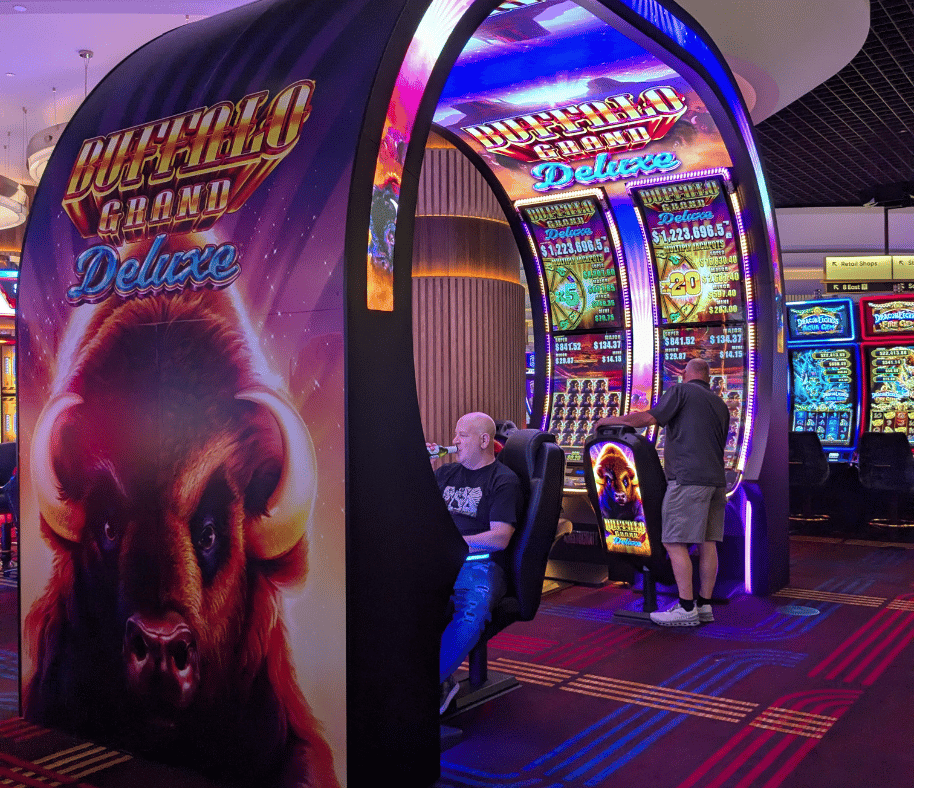- CONNECT collective
- Posts
- Addicted to Doing
Addicted to Doing

Casinos are candy to an overstimulated mind in search of dopamine hits.
I recently arrived back home from a cruise and, although I don’t gamble, I find that watching people in action at a casino offers far more entertainment than any award winning television series.
Did you know that there is a whole psychological aspect to casinos meant to keep you engaged?
If you’ve never stepped foot into a casino it’s a mind trip. There are no windows, no clocks, and just a few hidden exits that are strategically situated well away from the action.
Everything is brightly lit carnival-style, mostly by the slot machines that fill the majority of the space. These machines have the worst odds and attract the most players. The sounds of the slot machines overwhelm the casinos, pulling in passersby with ringing bells, animated characters, and a chance to win big money!
Addicted to Busyness
I’ve always been fascinated by human psychology, especially the parts that delve into why we do the things we do. And, I’m convinced our daily lives are becoming more and more like casinos.
Constant overstimulation leads to increases in cortisol (the dreaded stress hormone) and dopamine, and you’re overstimulated nonstop.
You wake up in the morning and turn on a screen to start your day. You’re multitasking at work. You’re multitasking at home. You watch screens to unwind in the evening (79% of adults state their screen time keeps them up at least three nights a week).
This is a disastrous recipe for a dissatisfied life. Why? Because you’ve trained your brain to be overstimulated. When that excessive stimulation is missing, you go out in search of it. But not in a thoughtful manner. No. Instead, you mindlessly and automatically fill the stimulus gap with more.
Just as casino slot machines entice would-be winners with the promise of a jackpot, you experience similar triggers in daily life. Your casino is created by anything that keeps that keeps your personal dopamine supply popping - more screen time, more shopping, more socializing, more multitasking.
Let’s zero in on multitasking. There’s an addictive quality to multitasking. I know, because I’ve been addicted to busyness for most of my adult life. I’ve also talked to many of you who habitually add new tasks or complicate existing ones to keep that feeling of excitement in daily life. When there is a break in the action, you compulsively fill it with more activity.
Breaks in action leave you depleted of the dopamine you crave. Your excessive multitasking has conditioned you to be busy so, even when you complain about how exhausted you are, you will still seek more things to keep you in active mode.
This is how busyness becomes addictive.
The spillover effect happens everywhere. Driving in the car you find yourself on your phone or listening to something on the radio. At home, there is something to fill every available second. The conditioning to be busy all the time is constantly and consistently reinforced.
Discomfort sets in when there is space.
Without contemplating why you feel uncomfortable, you instinctively fill that space.
Space Provides Definition
There is a tendency to focus on the space as a negative instead of a positive. But consider this - that space holds more value than the task completion. It’s pure gold. Just as the space around a music note defines its value; the space around your tasks define theirs.
Allowing space to envelop your tasks gives the mind time to rest, yes, but also to process information, express creativity, and reflect.
Overstimulation has become your response to downtime. The fear is that by not being busy you are perceived as lazy, even by yourself. This is all self-imposed.
Make quality downtime a priority, but don’t expect yourself to instantly embrace and enjoy it. It’s likely you won’t.
Remember, you’ve trained your brain to be “on” every moment of the day. Now, you’re training it to refrain from the constant buzz. It will feel like a big let down. Be prepared for something you label as boredom to overtake your thoughts.
This isn’t boredom. It’s your mind, body, and soul downshifting to a slower speed. Like a car on a highway being slowed down for construction sites, the change in pace will be painful. You will search for anything to fill the void, but you must resist that urge.

Daily Mindful Downtime
Schedule it. You aren’t naturally inclined to rest, so you’ll need to intentionally make space on your calendar. Start with 10-15 minutes a day, building to more substantial chunks of time.
Mindfully engage in a selected activity (e.g., reading a book, walking in nature) as opposed to “doing nothing.” If downtime is an unfamiliar practice to you, then you will struggle with any unstructured time. Create an environment where you perceive your use of time as purposeful.
Make space for reflection. How often do you crumble into an exhausted heap at the end of the day wondering how you accomplished nothing despite being on the go all day? Daily reflection teaches you to appreciate your experiences. You connect with how you’re using your time, making changes that benefit your life goals.
Connect to the value downtime offers. Remind yourself that by engaging in downtime you are regulating your nervous system, expanding your creativity, and allowing your brain to process everything that has happened to you throughout the day. These things are necessities, not luxuries.
Stop busying yourself into oblivion expecting fulfillment to come from the things you’re accomplishing. Tap into the part of you where inner peace and calm reside. This is where possibilities become endless.
Sending you all Peace, Love, & Harmony.

Do You Need Help Tapping Into Your Potential?
Are you struggling to meet your goals and wish you had support? Have you ever considered working with a coach? You may not know what a coach does.
One-on-One Coaching:
You and I develop an individualized plan targeting your specific goals
You receive individualized support from me
Answers to your specific questions
Guidance on your specific issues and blocks
Accessibility to me outside coaching sessions for added support (individual texts and emails to check in)
Your plan leads to learning how your personal growth is in your control
Are you ready to take action but are at a loss on what step to take next?
I can teach you how to get started and accelerate your growth by using repeatable methods. Need the tools? I’ve got them. The goal is always to make you independent. I should be working myself out of a job. Once you take off, you may want to have a session from time to time, especially if you are scaling your goals. A good coach teaches you how to stand on your own two feet. Contact me today. Are you ready to CONNECT?